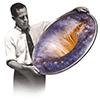In the original, unedited manuscript of the Townsend Brown biography – published in 2009 as Defying Gravity: The Parallel Universe of T. Townsend Brown – Chapter 76 – FTM, picks up the story the morning after the ‘Operation Peacock’ raid on the Decker compound near Philadelphia in the fall of 1966. (TMWMG Chapter 85).
Much of that original chapter dealt with the fabrication that has found a place in conspiracy lore as ‘The Philadelphia Experiment.’
Also stuffed into the middle of that chapter is a passage from Nick Cook’s 2001 book The Hunt For Zero Point: Inside the Classified World of Antigravity Technology.
At the time it was published in 2001, The Hunt… was the first scholarly publication that tried to deal objectively with the mysteries that orbit the life of Townsend Brown. It was an invaluable resource that I drew on on often as I was serializing my ownn work on the Internet starting in 1995.
After talking with Nick Cook (over Zoom) in November 2023, I thought it might be a good idea to go back and repost that passage from the earlier version:
_____________
Chapter 76 – FTMs
Curiously, Cook had his own “inside source” for his research, an individual who’s identity Cook admits in his opening acknowledgments is “deliberately blurred.” On page 81, he introduces “Dr. Dan Marckus” and describes him as “an eminent scientist attached to the physics department of one of Britain’s best known universities.” Over the 200 pages that follow, Marckus becomes Cook’s “go-to guy” whenever he encounters some aspect of science or institutional research that needs a better explanation.
Marckus, is, for example, the one who explains the ultimate potential of that quantum curiosity that gave Cook’s book it’s title, ‘zero point energy.’ Marckus seems to have some special insight into quantum physics when he tells Cook, “The argument is not about whether the ZPE field exists, but about how much energy it contains… in some calculations…there’s enough energy in an empty shoebox to blow the world apart.”
Later in the book, Marckus reminds Cook about that source of energy, and its potential to be used for good or ill. “Release that energy slowly and you’ve got a clean, safe reactor that can go on pumping out power forever. Speed up the process and make all the right connections and you’ve got a bomb, one that’ll make a thermo-nuke look like a child’s firecracker…”
This ‘Dan Marckus’ character seems to have valuable insights into all sorts of things that Cook encounters over the course of his wide-ranging investigations.
Indeed, the journey that began when a packet of papers showed up on Cook’s desk took him on an unimaginable odyssey on both sides of the Atlantic. Cook opened myriad doors into countless realms of science and pseudo-science along the way. Perhaps none is more improbable than his encounter with ‘Die Glocke’ — the infamous ‘Nazi Bell.’ And here, again, Marckus seems to have all the answers.
The legends of Die Glocke involve all kinds of late-in-the-war Nazi secret weapons research, conducted in this case in a mine in Czechoslovakia under the code name “Chronos” — the Greek word for “time.” As Cook recounts, the experiments “required large doses of electricity fed via thick cabling into a chamber hundreds of meters” under ground, where, in a “bell-shaped device comprising two contra-rotating cylinders filled with mercury or something like it had emitted a strange pale blue light…. Word had it that the tests sought to investigate some kind of anti-gravitational effect…”
A few days after his visit to the Czech mine, as Cook is preparing to board a flight from Munich back to the United States to continue his research, he gets Marckus on the phone.
“I know what they were trying to do,” Marckus tells Cook. “They were trying to generate a torsion field.”
Cook asks, “What is a torsion field? What does it do?
Marckus answers: “If you generate a torsion field of sufficient magnitude the theory says you can bend the four dimensions of space around the generator. The more torsion you generate, the more space you perturb. When you bend space, you also bend time.”
Cook says nothing. Marckus finishes the thought:
“They were building a fucking time machine.”
*
The concept of time travel is the ultimate flight of science fiction fancy. From H.G. Welles to Michael J. Fox, the whole idea of manipulating time has been relegated to the realm of scientific impossibility – or, at best to the extremely marginal fringe of remote quantum plausibility.
What, then are we to make of the conversation that Morgan had with Townsend Brown late one night when they were alone together in Dr. Brown’s lab in Homestead Florida, during the period when Morgan was being vetted and recruited to be some kind of “international security agent”?
Dr. Brown asked Morgan, “If it turned out that it would be possible to travel in time, what would you chose to do?”
And Morgan said he would “go back and save my little sister,” who drowned in a swimming pool accident a couple of years earlier.
When Dr. Brown explained that there might be “some natural rules against that,” Morgan pressed him further: “Is time travel possible?” he asked.
“Yes,” Dr. Brown answered, “I believe it is possible. In your lifetime.”
*
There is no way to know what Townsend Brown meant when he said that.
But this much must also be true: if time travel is possible “in your lifetime,” then, by it’s very nature, it is possible… now.

